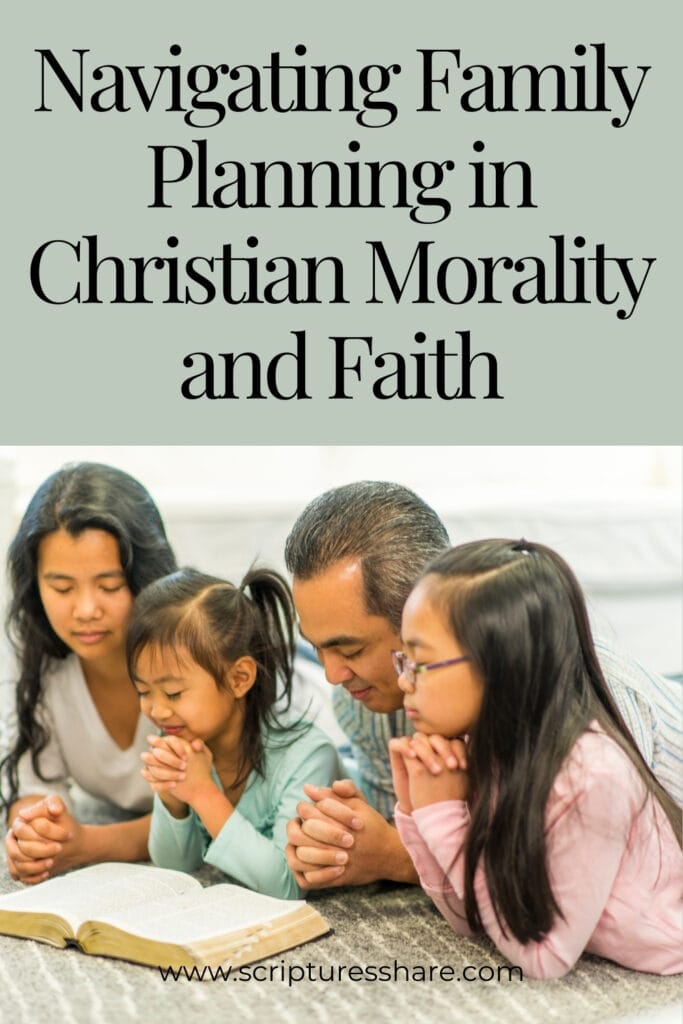No products in the cart.
Navigating Family Planning in Christian Morality and Faith
This post contains paid and/or affiliate links. I make a small commission at no extra cost to you. Please see our Privacy Policy.
The mix of Christianity and contraception is complex. Family planning is key for many, matching their beliefs. In Christianity, views on contraception vary widely.
There’s no single view, but understanding family planning in Christian morality helps. It guides in making informed choices.
We’ll look at family planning in Christianity, responsible decision-making, and the controversy over birth control.
We’ll also explore the role of children in marriage, ethical considerations in birth control methods, and personal reflections. This will help you understand the complexities of contraception in a Christian context.
Genesis 1:28
“God blessed them and said to them, ‘Be fruitful and increase in number; fill the earth and subdue it.'”
Key Takeaways:
- Christianity has varying perspectives on contraception.
- Family planning is important in Christianity to ensure the well-being and proper care of each child
- The controversy surrounding birth control within Christianity centers on artificial methods
- The role of children in marriage goes beyond procreation
- Ethical considerations play a role in choosing birth control methods within a Christian framework
The Importance of Family Planning in Christianity
In Christianity, family planning is very important. The faith values the family unit and the responsibility to care for relatives. Scripture, like 1 Timothy 5:8, shows the importance of providing for family. The Bible also sees children as precious gifts from God (Psalm 127:3).
These teachings make responsible family planning essential. It’s about making thoughtful decisions about family size and pregnancy timing. This way, individuals can fulfill their moral and religious duties while creating a caring environment for their children.
Exploring Christianity and family planning shows that scriptures encourage responsible decision-making. Let’s dive deeper into the principles guiding us in this life aspect.
Proverbs 16:9
“In their hearts humans plan their course, but the Lord establishes their steps.”
Responsible Decision-Making in Family Planning
Caring for a child means making wise decisions for their needs. When planning a family, consider emotional, financial, and time aspects. These are key to providing the best for each child.
The decision to have children is God’s, but parents have the responsibility of planning. This means choosing based on our values to give our children the best upbringing.

The Importance of Wise Decisions
- Emotional Investment: Each child needs love, attention, and care. Parents can give this by having fewer children.
- Financial Resources: Raising a child costs money for education, healthcare, and more. Parents can provide stability by thinking about money.
- Time: Parenting is hard work that needs time and energy. Making smart choices about family lets parents spend quality time with their kids.
When making these choices, we should think about our love for our kids and wanting the best for them. Planning our families wisely helps us balance wanting a big family with being able to care for each child.
The Controversy Surrounding Birth Control in Christianity
The topic of birth control in Christianity is often debated, mainly about artificial methods. Different churches have different views, with the Catholic Church only supporting natural family planning. But, other Christian groups might see things differently.
One big argument is about hormonal birth control and biblical teachings on sex in marriage. Some say it messes with nature and goes against life’s sanctity. Others believe it helps couples plan their families and fulfill their roles as parents.
Despite the debate, the Bible also talks about the special bond of sex in marriage. This bond is seen as a gift from God, strengthening the marriage.
Natural family planning methods have become popular in Christianity. They involve tracking a woman’s cycle and avoiding sex when she’s fertile. Many see it as a moral choice that respects God’s plan for reproduction.
The debate on birth control in Christianity shows the many views within the faith. It’s a complex issue that needs careful thought of biblical teachings, personal beliefs, and life situations.
Each person and couple should pray fully decide on family planning based on their faith.
1 Corinthians 7:5
“Do not deprive each other except perhaps by mutual consent and for a time, so that you may devote yourselves to prayer. Then come together again so that Satan will not tempt you because of your lack of self-control.”
The Role of Children in Marriage
In Christian marriages, children are important but not the only reason for the union. The Bible says marriage is more than just having kids. It’s about Christian hope for eternal life.
Marriage is a covenant that honors God. It’s a bond between two people who promise to love and support each other, like Christ and the Church.
Whether or not they have kids, a marriage’s value comes from its love, respect, and spiritual growth.
Deciding to have children is a personal choice that should be made with prayer and thought. Christian couples should consider if they’re ready, financially stable, and emotionally prepared. They aim to create a loving and safe home for their children.
But, Christian hope is not just about having kids. It’s about eternal life through Christ. Even without biological children, a marriage can be meaningful. Couples can make a difference by fostering, adopting, or mentoring others.
Marriage is more than just having kids. It’s about building a partnership that honors God and strengthens the bond between spouses. It also helps the Christian community grow. While kids are a blessing, they shouldn’t define a marriage’s value.
The focus should be on building a loving, Christ-centered relationship. This relationship should reflect the essence of Christian hope.
Ethical Considerations in Birth Control Methods
Choosing a birth control method involves ethical thoughts. As Christians, we must think about how our choices match our beliefs and values.
Natural Family Planning
Natural family planning is often seen as fitting with Christian values. It tracks a woman’s fertility cycle and advises against sex when she’s fertile. This method respects the body’s natural processes and doesn’t block new life.
Artificial Methods of Contraception
Some couples might pick artificial contraception, like barrier methods or hormonal ones. These aren’t natural but can be okay if they don’t stop life. For example, the Catholic Church allows certain contraceptives that don’t block sex’s purpose.
Evaluating Ethical Considerations
When looking at birth control options, think about harm, intent, and personal values. What’s right for one couple might not be for another. Each situation is different.
- Consider the side effects and health risks of each method.
- Think about the method’s purpose – is it just for family planning or other reasons?
- Reflect on how the method fits with your beliefs and values.
Choosing a birth control method is a personal decision. It should be made with prayer and careful thought. Getting advice from trusted mentors or religious leaders can also help.
Psalm 127:3-5
“Children are a heritage from the Lord, offspring a reward from him. Like arrows in the hands of a warrior are children born in one’s youth. Blessed is the man whose quiver is full of them.”
Personal Reflections: Individual Convictions and Decision-Making
Choosing a birth control method involves personal beliefs and responsible choices. We seek the Lord’s guidance in this decision. We consider our unique situation and align with Christian values.
Every couple’s path is unique. What works for one might not for another. We must think about health, lifestyle, and beliefs. It’s key to learn about the options and talk to healthcare pros who get our convictions.
Family planning is the parents’ responsibility. It’s not for others to decide how many kids a couple should have. We make decisions for our family’s well-being, based on our faith and convictions.
Responsible decision-making is more than just picking a birth control method. It’s about embracing parenthood and caring for each child.
We see each child as a gift from God, deserving of love and opportunities to grow.
- We value life and think carefully about birth control choices.
- Open and honest talk between partners is key in picking the right method.
- We aim to make choices that benefit our family’s health and well-being.
The choice of birth control is deeply personal. We encourage couples to seek advice, reflect on their beliefs, and make choices that match their values and responsibilities as parents.
Conclusion
The topic of Christianity and contraception brings up many different views. There’s no one right answer, but people must think about their faith when planning their families. Making choices about family planning needs careful thought, guided by Scripture and personal beliefs.
Looking at the Bible and seeking God’s guidance helps people and couples deal with the tough parts of contraception. It’s key to remember that family planning is a personal choice. No one else should decide how many kids a couple wants.
At the end of the day, making smart choices about family planning lets people follow their Christian beliefs. Even though opinions on contraception vary, the important values of love, compassion, and caring for what we have stay at the heart of the discussion. These values are key in talking about family planning in Christian morality.
FAQ
What is the position of Christianity regarding contraception?
Christianity has had varying perspectives on contraception throughout history, with different branches of the faith holding different views. While there is no consensus, understanding the intersection of Christianity and contraception is important for individuals seeking to align their family planning choices with their religious beliefs.
Why is family planning important in Christianity?
Christianity strongly emphasizes the family unit and the responsibility to care for one’s relatives. Scripture emphasizes the importance of providing for family members and extols the value of children as gifts from God. Responsible family planning becomes crucial to ensure each child’s well-being and proper care.
What is the controversy surrounding birth control in Christianity?
The issue of birth control has been a subject of controversy within Christianity, particularly regarding artificial methods. The Catholic Church, for example, only condones natural family planning methods, while other branches of Christianity may have different perspectives. There are debates about whether hormonal methods of contraception align with the biblical teachings on the purpose of sex within marriage.
What is the role of children in marriage according to Christianity?
While procreation is essential, the Bible does not define having children as the sole purpose of marriage. Christian hope focuses on eternal life rather than having genetic offspring. The presence or absence of children does not define the validity or completeness of a marriage, as marriage is a covenant relationship that honors God.
Are there ethical considerations in choosing a birth control method?
Ethical considerations can influence the decision of which birth control method to use. Natural family planning, which includes methods like fertility awareness, is often seen as aligning with Christian values because it does not interfere with the natural processes of the body. However, some couples may choose to use artificial methods of contraception, such as barrier methods or hormonal contraception, as long as they do not have abortive effects.
How should individuals make decisions about birth control in light of their Christian faith?
The decision of which birth control method to use often comes down to personal convictions and responsible decision-making. Couples should prayerfully seek the Lord’s guidance in making this decision, considering their unique circumstances and family dynamics. Ultimately, the responsibility of family planning lies with the parents, and external entities should not dictate the number of children a couple has.











